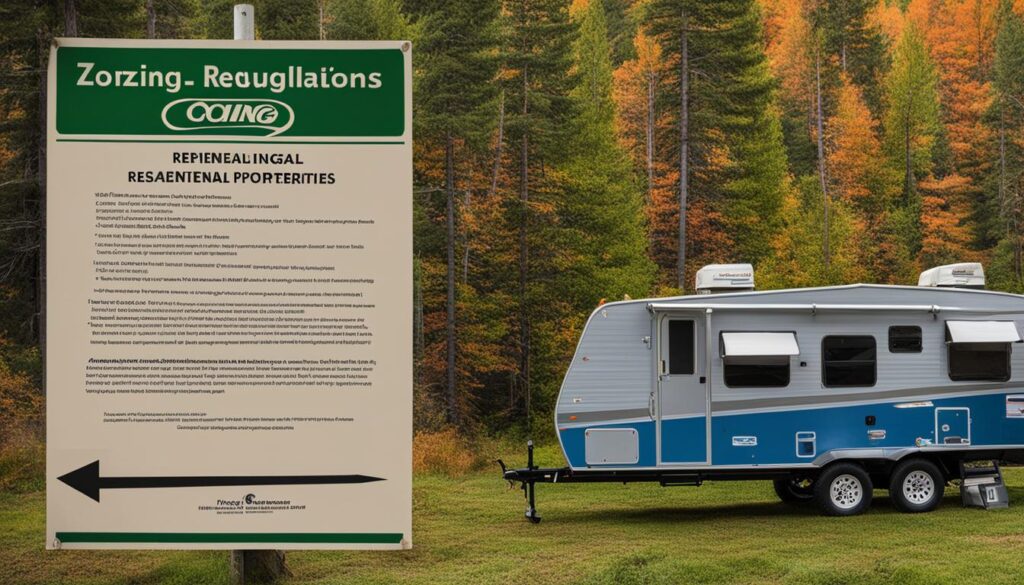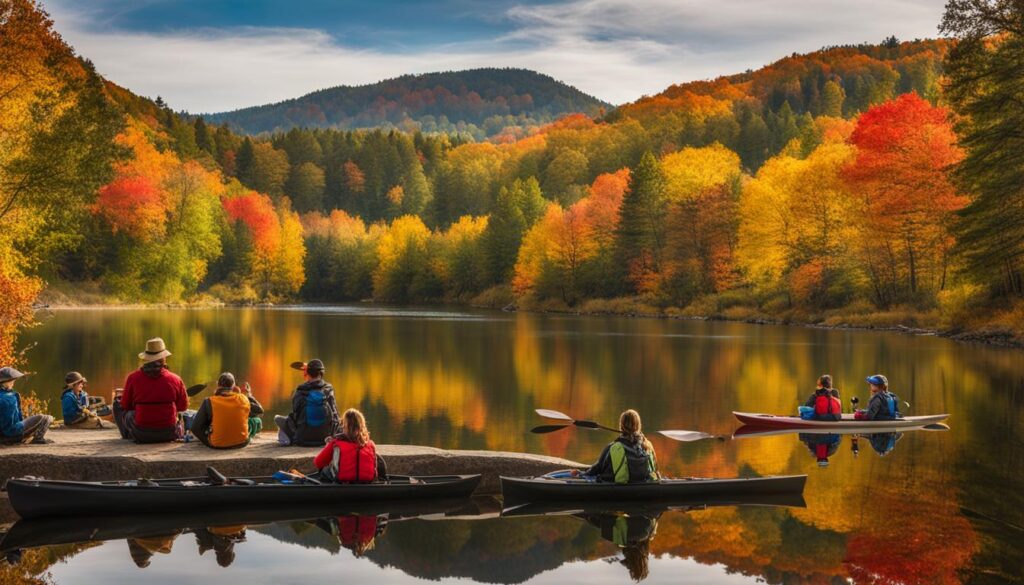Have you ever wondered if it’s legal to live in an RV on your own property? Many people dream of the freedom and flexibility that comes with living in a camper, but the truth is that the laws surrounding RV living can be complex and vary from one jurisdiction to another. So, can someone actually live in a camper on their own land without breaking the law? Let’s dive into the legal requirements and zoning regulations for camper living to find out.
Living in an RV on your property is generally allowed, but there are limitations you need to be aware of. While it may be legal to temporarily sleep in an RV on your land, using it as a permanent dwelling is a different story. To ensure compliance, it’s essential to check with your HOA and local zoning laws regarding camper living.
Key Takeaways:
- It is generally legal to temporarily sleep in an RV on your own property.
- Using an RV as a permanent dwelling is typically against the law.
- Check with your HOA and local zoning laws for specific regulations.
- Some jurisdictions allow living in an RV on your land, but you must adhere to all applicable housing codes.
- If you want to live in your RV permanently, explore options such as registering it as a recreational vehicle, an accessory dwelling unit, or parking it in a designated RV park or campground.
Contents
Is it Legal to Park an RV on Your Property?
Many RV enthusiasts dream of having the convenience of parking their recreational vehicle right on their own property. But is it legal to park an RV on your property? Let’s explore the legality and regulations surrounding RV parking.
The good news is that, in most cases, it is legal to park an RV on your property. However, there are a few factors to consider. Firstly, you need to check your Homeowners’ Association (HOA) guidelines, as some HOAs may have specific restrictions on RV parking. It’s essential to review the CC&Rs (contract) for any limitations related to RV parking on your property.
In addition to HOA regulations, you also need to consider local zoning laws. While temporary parking of an RV is generally allowed, permanently residing in an RV as a dwelling is often against the law. The federal government classifies RVs as recreational vehicles and not permanent dwellings. Therefore, living in an RV full-time, especially in residential areas, is generally not permitted.
Even though parking an RV on your property is legal, it’s important to note that RVs are not intended for permanent living. They lack the necessary infrastructure and amenities of a conventional home and are designed for recreational use.
However, it’s essential to be aware that regulations can vary depending on your local jurisdiction. Some areas may have more lenient enforcement or specific zoning laws that permit full-time RV living on private property. It’s crucial to research and understand the RV parking regulations in your specific location to ensure compliance with the law.
If you’re unsure about the regulations in your area, it’s recommended to consult with local authorities or seek legal advice to clarify any uncertainties. They will be able to provide you with accurate information regarding the legality of parking an RV on your property.
Benefits of Parking an RV on Your Property
Parking an RV on your property offers several advantages. It allows you to have easy access to your RV for spontaneous trips or weekend getaways. It also provides the flexibility to customize and maintain your RV according to your preferences without the limitations often imposed by RV parks or storage facilities. Additionally, having your RV conveniently parked on your property saves on storage costs and keeps your vehicle within reach whenever you need it.
| Pros of Parking an RV on Your Property | Cons of Parking an RV on Your Property |
|---|---|
|
|
Before parking your RV on your property, ensure you comply with any applicable regulations and guidelines. Always prioritize safety, respect your neighbors’ privacy and maintain the aesthetics of your community.
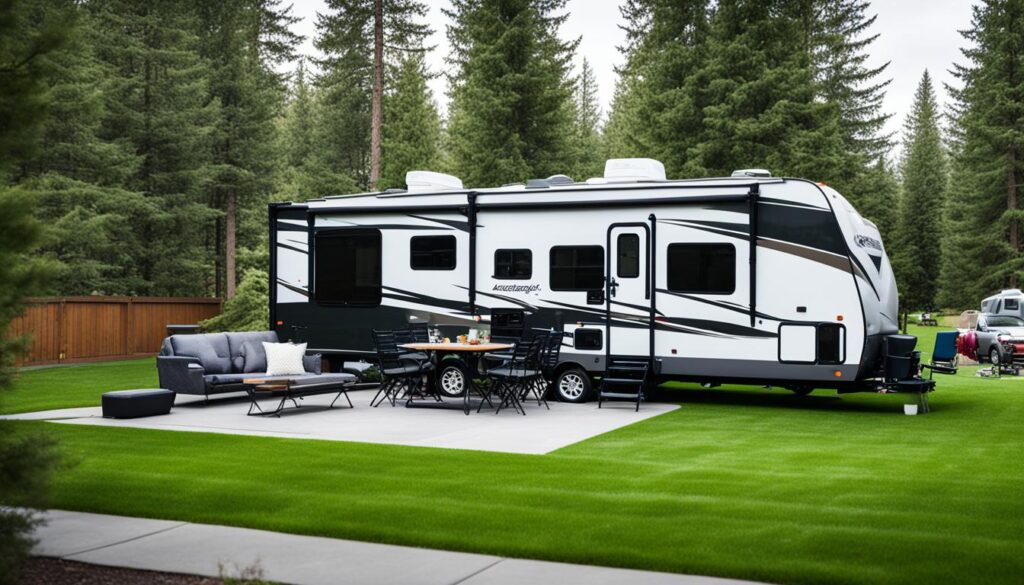
Can You Live In a Campervan On Your Land?
In some jurisdictions and counties, it is legal to live in a campervan on your land. However, you need to check the local codes and ensure that your campervan complies with all the housing codes and regulations that apply to permanent houses.
If you are considering living in a campervan as a long-term solution, it is important to research the zoning laws for your city or county. Some areas may have restrictions on full-time RV parking or living in an RV on your own land. It’s crucial to understand these regulations before making any decisions.
Additionally, if you want to use your campervan as a guest house or temporary living space for guests, it may be allowed. However, keep in mind that the duration of stay may be limited, depending on local ordinances and regulations.
To ensure a smooth and legal experience, it is recommended to consult with local authorities or an attorney who specializes in land use and zoning laws. They can provide guidance and help you navigate the process of living in a campervan on your own land.
Benefits of Living in a Campervan
Living in a campervan offers several advantages, including:
- Flexibility: Campervan living allows you to move and explore different locations easily.
- Reduced Expenses: It can be a cost-effective housing solution, as campervans typically have lower maintenance and utility costs compared to traditional homes.
- Minimalistic Lifestyle: Living in a campervan encourages a simpler, less materialistic lifestyle.
- Close-to-Nature Experience: Campervan living allows you to immerse yourself in nature and enjoy the outdoors.
Challenges of Living in a Campervan
While there are benefits to living in a campervan, it’s essential to consider the challenges as well:
- Limited Space: Campervans have limited living and storage space, which can be challenging, especially for families or individuals with many possessions.
- Utilities and Amenities: Access to water, electricity, and sewage may be limited or require additional planning and resources.
- Privacy and Security: Campervans may lack the same level of privacy and security as traditional homes.
- Weather Dependency: Extreme weather conditions can impact the comfort and livability of a campervan.
Despite the challenges, many people find campervan living to be a rewarding and fulfilling experience. It offers the freedom to travel, live sustainably, and embrace a simpler lifestyle.
| Advantages | Challenges |
|---|---|
| Flexibility | Limited Space |
| Reduced Expenses | Utilities and Amenities |
| Minimalistic Lifestyle | Privacy and Security |
| Close-to-Nature Experience | Weather Dependency |
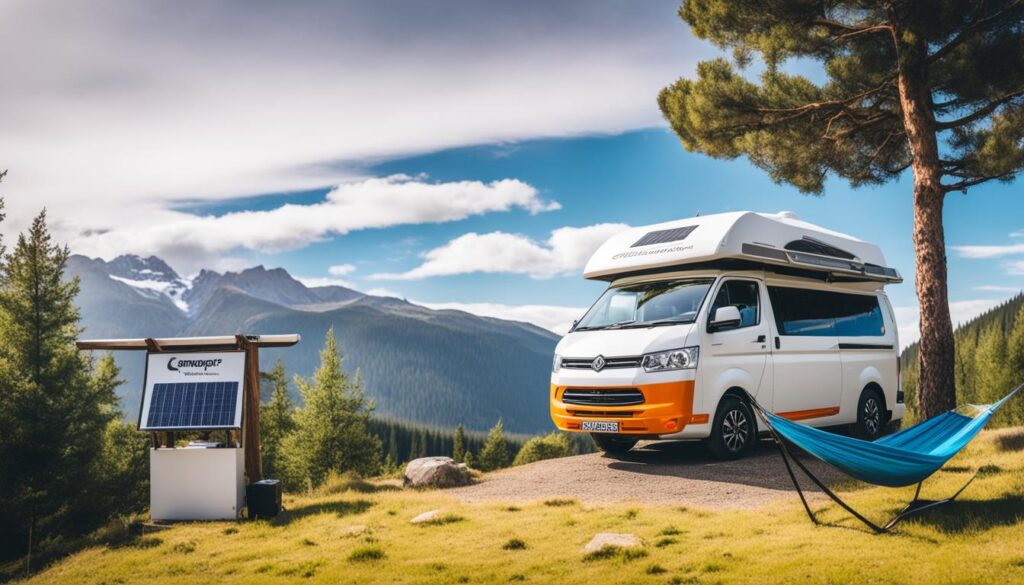
What You Can Do with Your RV in Your Backyard
While living full-time in an RV on your property might not be legal, there are still various ways you can utilize your RV in your backyard. One option is to consider using your RV as a guest house for temporary stays. This can provide a convenient and comfortable accommodation option for your guests, whether they are friends, family, or even Airbnb guests.
By transforming your RV into a guest house, you can create a cozy and private space for visitors to stay, separate from your main living quarters. Your guests can enjoy the comfort and amenities of an RV while having their own space and privacy. It can also be an excellent way to generate additional income by renting it out when not in use.
Benefits of Using an RV as a Guest House:
- Flexibility: You can accommodate guests without needing extra rooms in your house.
- Privacy: Your guests can have their own separate space.
- Cost-effective: It can be a more affordable option compared to building a permanent guest house.
- Comfort: RVs offer various amenities, including beds, kitchens, and bathrooms, ensuring a comfortable stay for your guests.
Before using your RV as a guest house, it is essential to check with your Homeowners Association (HOA) and local regulations regarding RV usage and parking. Some HOAs may have specific guidelines or restrictions, such as limiting the duration of guest stays or requiring additional permits. It is crucial to comply with these regulations to avoid any potential fines or penalties.
In addition to HOA regulations, some cities may have specific requirements for using RVs as guest houses. These requirements can include guidelines for utility connections, parking locations, and health and safety standards. Researching and understanding these regulations will ensure that you are in compliance with local laws and can provide a safe and enjoyable experience for your guests.
Remember, not all city ordinances and HOA rules are the same. Consult with your local authorities or HOA to understand the specific regulations that apply to your area.
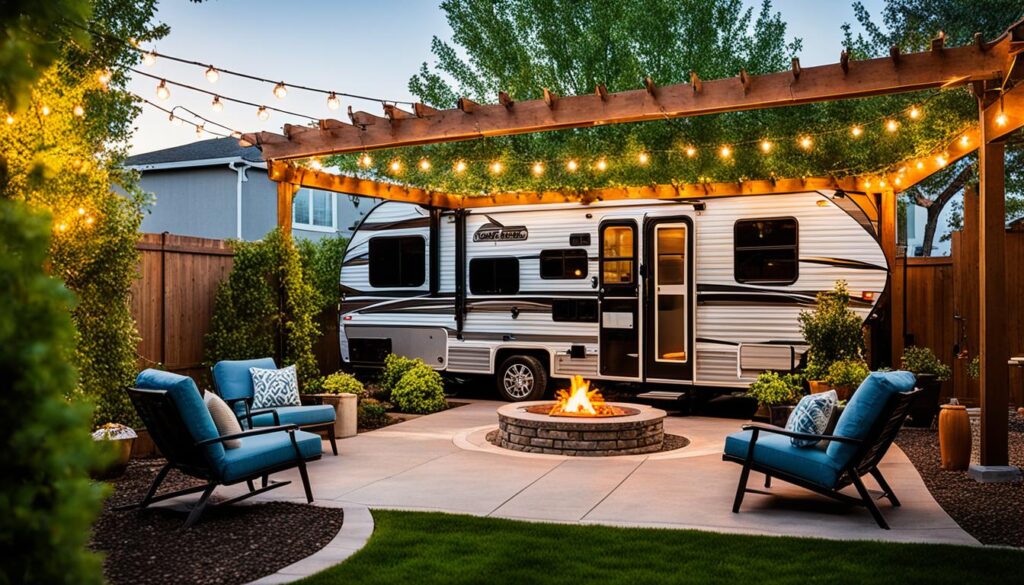
| Pros | Cons |
|---|---|
| Provides accommodation for guests | Must comply with HOA and local regulations |
| Flexible and cost-effective option for guest housing | May require additional permits or inspections |
| Allows for rental income when not in use | Some cities have restrictions on guest stays |
| Offers privacy and comfort for guests | Utilities may need to be connected and maintained |
How to Live in an RV in Your Own Land?
If you are considering living in an RV full-time on your own land, it is important to familiarize yourself with the state and local laws that govern RV living. Each state and county may have their own specific regulations, which may include requirements for permits, inspections, and compliance with utility regulations.
Before proceeding with living in an RV on your land, take the time to research and understand the state and local laws pertaining to RV living. It is crucial to choose a location that allows for RV living and provides access to basic utilities such as water, electricity, and sewage.
Depending on your area, you may need to obtain permits, connect to existing utilities, and establish a permanent address. It is essential to ensure that your RV complies with all applicable regulations, both federal and state, to avoid any legal issues or penalties.
By following the necessary steps and adhering to the state and local laws, you can enjoy the freedom of living in an RV on your own land while ensuring that you are in compliance with all relevant regulations.
FAQ
Can someone live in a camper on my property?
It is legal to temporarily sleep in an RV on your property, but it is illegal to use an RV as a permanent dwelling.
What are the legal requirements for living in a camper?
If you want to live in your RV permanently, you have a few options, including registering it as a recreational vehicle and parking it in an enclosed space, registering it as an accessory dwelling unit, or parking it in a designated RV park or campground. It is important to check the rules and regulations in your local area, as enforcement may vary.
What are the zoning regulations for camper living?
Some jurisdictions and counties allow living in an RV on your land, but you must adhere to all applicable housing codes. It is important to research the zoning laws for your city/county, as some areas may have restrictions on full-time RV parking or living in an RV on your own land.
Is it legal to park an RV on your property?
It is legal to park an RV on your property, but there may be restrictions and regulations depending on your HOA guidelines and local zoning laws. Even though temporary residing in an RV is legal, permanently residing in an RV as a dwelling is typically against the law.
Can you live in a campervan on your land?
In some jurisdictions and counties, it is legal to live in a campervan on your land. However, you need to check the local codes and ensure that your campervan complies with all the housing codes and regulations that apply to permanent houses.
How can you use your RV in your backyard?
Some cities and neighborhoods allow using an RV as a guest house for temporary stays. However, it is important to check with your HOA and local regulations regarding RV usage and parking. There may be restrictions on how long guests can stay in the RV and what utilities can be used.
How can you live in an RV in your own land?
If you want to live in an RV full-time on your own land, you need to make sure you are complying with state and local laws. Each state and county may have specific regulations regarding full-time RV living, including permits, inspections, and compliance with utility requirements.
